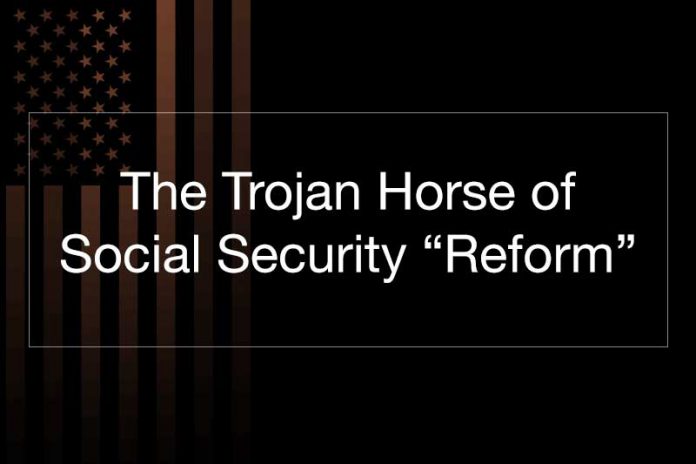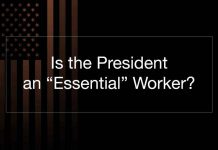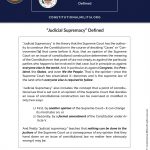Last Updated on January 17, 2022 by Constitutional Militia
All too often, the remedies politicians put forward for problems they have created only make matters worse. That is definitely the case with the Bush Administration’s proposal to “reform” Social Security. The plan for “private” or “personal” accounts through which workers will be required to invest in the stock market some percentage of their gross receipts from employment has been widely criticized on economic and political grounds. To date, however, next to no one has recognized that, constitutionally, the Administration’s scheme is a Trojan Horse: one of the most dangerously open-ended assertions of blatantly unconstitutional power to come out of Washington in decades.
Contrary to the misunderstanding widespread among the general public, Social Security is not an “insurance” program. Nowhere does the Constitution empower Congress to “insure” anyone. Apparently, even Franklin D. Roosevelt and his pliant minions in Congress understood this when they crafted the system. Social Security consists of two parts: a purported “excise” tax on the sale of certain individuals’ labor, calculated as a percentage of their gross receipts; and a “transfer payment” to other individuals in the form of an old-age benefit. (By the way, do not be fooled: Economically speaking, the employer pays no part of this tax. Were it not for Social Security, the employer would pay the so-called “employer contribution” to the worker, because the total cost of what the employer pays to the worker, and to the government on behalf of the worker, represents what the worker is worth to the employer, and therefore what competition would compel the employer to pay the worker in a free market.) The Social Security “excise” tax and “transfer payment” are not inextricably connected, however, in the sense that payment of the tax today affords the taxpayer a legally vested, indefeasible, contractual right to receipt of any particular benefit later on. Rather, Congress could continue to extract the tax, without payment of any benefits; or to pay benefits, without collection of that particular tax; or to raise (or lower) the tax, without raising (or lowering) the benefits; or to raise (or lower) the benefits, without raising (or lowering) the tax.
The Supreme Court made all this clear in its decision in Flemming v. Nestor, 363 U.S. 603 (1960). Under Social Security, the Court explained,
persons gainfully employed, and those who employ them, are taxed to permit the payment of benefits to the retired and disabled, and their dependents. Plainly the expectation is that many members of the present productive work force will in turn become beneficiaries rather than supporters of the program. But each worker’s benefits, though flowing from the contributions he made to the national economy while actively employed, are not dependent on the degree to which he was called upon to support the system by taxation.
363 U.S. at 609-11. See also Helvering v. Davis, 301 U.S. 619, 635 (1937); Hisquierdo v. Hisquierdo, 439 U.S. 572, 575 & n.6 (1979).
In plain English, an individual has no enforceable legal right to collect Social Security benefits, simply because he has paid Social Security taxes. Such right as he has to any benefit depends on the largesse of Congress, which may change the benefit at any time–or, as was upheld in Nestor’s case, extinguish the benefit entirely.
If this is a cloud, though, it has a silver lining, because it means that the Social Security System could be terminated altogether. For example, by removing all younger workers from the system, allowing older workers nearing retirement either to drop out or to remain in the system (with appropriate adjustments to any benefits to be paid), and paying off already retired workers, and those few who then retire while in the system, out of general tax revenues, until the pool of individuals remaining in the system diminished to zero by natural attrition.
Both constitutionally and politically, a solution of that sort would be the soundest course of action. First, highly questionable are the supposed powers of Congress to tax individuals’ labor and to pay old-age pensions. True, Congress has the constitutional “Power to lay and collect Taxes, Duties, Imposts and Excises” under Article I, Section 8, Clause 1. And, in principle, if Congress can impose an “excise” tax of 1% on individuals’ gross sales of their own labor, it can impose a tax of any percentage it likes. (Remember that, unlike the individual income tax, the Social Security “excise” tax allows no exemptions, deductions, or other subtractions from the amounts of earnings subject to exaction.) Human labor, however, is a very special kind of property. At some point of taxation far less than 100%, an individual whose earnings derived from labor are subject to forcible seizure is no longer a free man, but a slave. And slavery is unconstitutional perforce of the Thirteenth Amendment, which limits Congress’s power to tax (as well as all its other powers). So, the legality of Social Security’s “excise” tax on labor is a very shaky matter. (Or it would be, were the Judiciary composed of honest and learned constitutionalists.)
Similarly, under Article I, Section 8, Clause 1, Congress has the power to spend tax receipts “to pay the Debts and provide for the common Defence and general Welfare of the United States”. But nowhere does the Constitution delegate to Congress any power to pay a pension or old-age benefit of any kind to anyone (except perhaps those who have served in the Army, Navy, and Militia, or as government employees). So, unless the power to “provide for the * * * general Welfare” allows Congress to spend tax revenues on whatever Congressmen fancy to be the “general Welfare” (which would expand the powers of Congress to the limits of human imagination), Social Security benefits are of deeply dubious legality, too.
Second, totally undesirable in a constitutional republic is the economic dependence on politicians that Social Security creates among all workers and their families. This dependence appears in the supposed “popularity” of Social Security. Looked at objectively, there is no “popularity” about it at all, only fear. People near the end of their productive lives fear to lose the benefits Social Security promises them in their retirement, when they will be unable to work and without other financial means. They “support” the system only because they have little or no choice, other than to go hungry in their old age. (No doubt the popularity of their masters among dogs is explicable on the same basis.) People in or near retirement for whom Social Security is “popular” forget that, had not Social Security taxes been extracted from their paychecks throughout their productive lives, they would probably have amassed savings of their own sufficient to enable them to thumb their noses at the political class, in the security of their own economic independence.
Dependence on politicians for economic security is not the end of the story, however. The same politicians who promise to “protect” Social Security are typically the fascists, socialists, or other collectivists and “it takes a village” idiots who also strain their every muscle to expand to Stalinist proportions the powers of the central government in Washington, D.C. So, when people vote for politicians who proclaim their intent to “save” Social Security, by default they vote for more and more and even more of the collectivistic agenda—thereby not only tightening around their own necks the fetters of economic dependence that Franklin Roosevelt forged, but also empowering new blacksmiths to hammer more heavy links of usurpation and tyranny onto their chains.
In this light, the Bush Administration’s proposal for “reform” of Social Security appears as a most dangerous innovation. First, it is supposedly designed to “save” Social Security from collapse. Whether it can do so is debatable. What should not be questionable in a free country is that Social Security ought not to be preserved at all, but should be phased out as quickly as possible. That the system is in chronic crisis should be proof enough of its unworkability. To attempt to “save” the system is equivalent to camouflaging a gangrenous leg with cosmetics, rather than amputating it.
Second, and more important, the Administration’s proposal is even more unconstitutional than Social Security itself. Its specific legal demerits aside, Social Security at least apes constitutional legislation. It consists of a tax–and Congress does have a power to tax. And it consists of a spending program–and Congress does have a power to spend. Where, though, does Congress find a power in the Constitution to require individuals to invest some percentage of their earnings from labor? (Surely, requiring individuals to invest their own individual earnings is neither to tax them, nor to spend public moneys for the “general Welfare”.) No doubt, diverting mammoth sums from individuals’ paychecks to the stock market will be welcomed by the high-flying operators on Wall Street. But assisting big-time speculators and manipulators in New York to create a huge and (for them) profitable “bubble” in the market is not, by any common-sense reckoning, a plan that contributes to the “general Welfare” (as opposed to the electoral success of certain Menshevik politicians). For a dangerous “bubble” it will surely prove to be, unless by chance the percentage of individual workers’ gross receipts that end up being invested by force of law turns out to be the same or a lesser percentage than those workers would have invested by their own free choice had the money been left in their own hands for their own purposes. Which no one will know, of course, unless and until the “bubble” bursts–with all the catastrophic results the explosion will entail (except, of course, to the Wall-Street insiders who will have cashed out in the nick of time).
In addition, if Congress can require an individual to invest some percentage of his gross receipts from labor so as to provide for his own retirement, and thereby save the government the cost of paying him a pension, why cannot Congress stipulate which investments are allowable, because of their supposed economic soundness; and which investments are not allowable, for the contrary reason?
And if Congress can stipulate which investments are allowable, why cannot Congress regulate those companies, their officers, their production and marketing, and so on, in order to insure that they continue to operate in what Congress deems to be a sufficiently safe, secure, and profitable manner? (After all, Congress surely should not suffer ignorant workers to invest in fly-by-night business schemes that leave them high and dry at retirement age, forcing the government to step in with welfare payments.) One must wonder, then, why the Bolsheviks in Congress oppose President Bush’s plan. For once in operation, it would provide them with a perfect excuse and claim of authority to subject America’s entire productive system to bureaucratic oversight and control.
Furthermore, if Congress can require that an individual must invest some percentage of his gross receipts from labor, why cannot it also require that he consume some percentage? After all, investment and consumption are not economically separate and distinct. Consumers’ spending stimulates production, which stimulates investment and creates jobs, thereby enabling workers to earn wages and provide for their retirement themselves.
And if Congress can dictate to individuals what percentage of their gross receipts from labor they must consume, why cannot it tell them how, or how not, to consume? Surely, political control over patterns of mass consumption can reduce the overall costs of retirement. For example, if working individuals expend their wages on junk foods, cigarettes, alcohol, and other deleterious substances–if they fail to use their incomes to join health clubs or yoga classes—if they squander too much money on automobiles and gasoline, so that they end up on their fat behinds driving around, rather than slimming down by jogging or peddling bicycles…why can not, why should not, Congress step in? After all, if Congress fails to make people healthy throughout their productive lives, the national bill for medical care in their old age will rise to the stratosphere. So, again, one wonders why the Bolsheviks in Congress oppose the President’s proposal. For if Congress has a power to coerce investment to provide for individuals’ retirement, it logically has the power to coerce consumption (or non-consumption) for that purpose, too, which would effectively socialize every aspect of life in these United States.
In sum, the Bush Administration’s proposal to “reform” Social Security implicitly asserts that Congress has powers to force Americans to become wealthy (through control of their investments), and healthy (through control of their consumption). The only thing missing is a Congressional power to force them to become wise, as well. One can be sure, however, that the latter power will never be used. For if Americans ever did wise up, they would never allow the Administration or Congress to tell them how to be wealthy or healthy–or much of anything else.
©2005 Edwin Vieira, Jr. – All Rights Reserved.




































